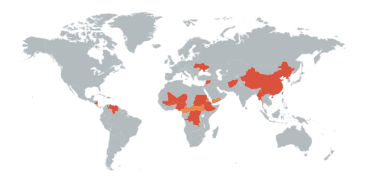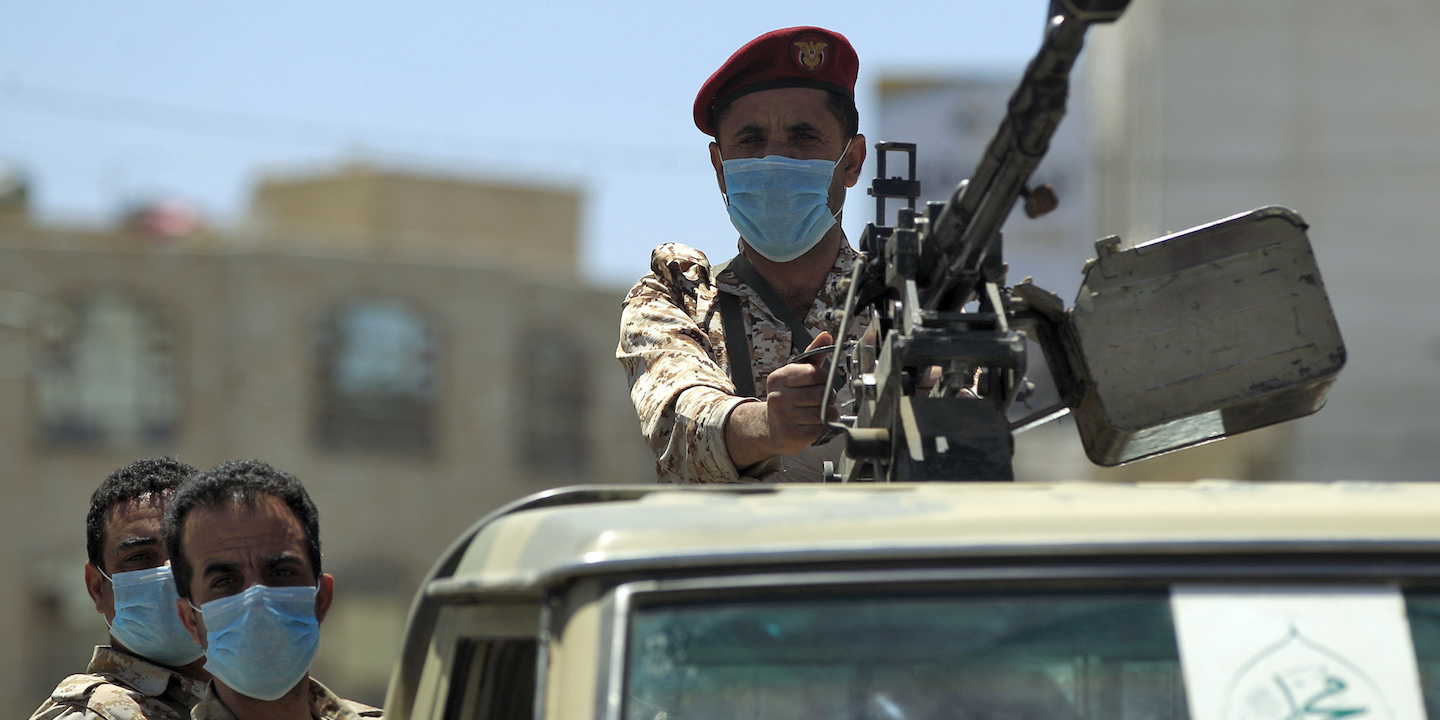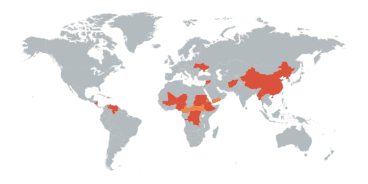

Joint Statement: Yemen – Urgent Measures Needed to Protect Civilians from COVID-19
The conflict in Yemen is entering its sixth year, resulting in what is considered the worst man-made humanitarian crisis in the world. On 10 April, the first COVID-19 case was confirmed in the country. The warring parties, donor states, the United Nations (UN) and the European Union (EU) must take immediate and urgent steps to mitigate COVID-19’s potential outbreak and catastrophic impact in Yemen.
In the face of COVID-19, civilians in Yemen are particularly and acutely vulnerable. Due to the war, the health system has been severely damaged. The warring parties have obstructed and impeded humanitarian aid. Other contagious diseases have spread, including in detention facilities. Thousands of civilians have been killed and injured; more than 3.6 million people have been internally displaced; and over 80 per cent of Yemen’s population is now dependent on humanitarian aid, including for food, shelter and other basic services. According to the UN Humanitarian Coordinator for Yemen, Lise Grande, “ten million people are a step away from famine and seven million are malnourished.”
Addressing the Health, Humanitarian and Economic Crises
The health sector in Yemen has been decimated, the economy has crumbled, and the humanitarian response has been repeatedly and blatantly obstructed and interfered with by the warring parties.
The routine destruction and repeated occupation of health care facilities, as well as the killing and wounding of medical workers, has weakened Yemen’s health system, inflicted widespread suffering on civilians, and contributed to making the country increasingly vulnerable to health shocks like that posed by COVID-19. Only half the country’s health facilities are functional. Many specialists, essential equipment and supplies, including medicine, personal protective equipment and ventilators, are scarcely available. In addition, Yemen has a recent history of outbreaks of communicable diseases, with the highest recorded number of suspected cholera cases in recent history.
The warring parties have blatantly obstructed and impeded the humanitarian response throughout the conflict, as well as weaponized the economy and food[1].Yemeni civil servants, including some doctors and health workers, in different parts of the country have not been paid their salaries for nearly two years. In 2019, the Group of Eminent International and Regional Experts on Yemen (GEE) concluded that “starvation may have been used as a method of warfare by all parties to the conflict.”
Some international organizations announced the suspension of certain aid to Yemen in late March as a response to Houthi interference in aid deliveries and misuse of funds [2]. The United States, the largest donor to Yemen, decided to cut humanitarian assistance on 27 March 2020, including funding that would help prevent the spread of the coronavirus. The day before Yemen’s first COVID-19 case was announced, the World Food Programme said it was set to halve aid to parts of Yemen. An end to the interference in humanitarian aid by parties to the conflict is crucial, but the withdrawal of humanitarian aid, including life-saving supplies, at a time of urgent need risks creating an escalating catastrophe in Yemen.
Unsurprisingly, those already vulnerable—the displaced, those deprived of their liberty, refugees, migrants, the sick, hungry, and poor—have been and will be hit the hardest. In calling for the immediate lifting of international sanctions to prevent hunger crises in countries hit by COVID-19, the UN Special Rapporteur on the Right to Food urged the international community “to pay particular attention to the situation of civilians trapped in conflict settings, and notably those already experiencing acute violations of their right to food, such as in Yemen.”
Releasing Arbitrarily Held and Vulnerable Detainees and Improving Detention Conditions
Hundreds of civilians, including journalists and human rights defenders, have been arbitrarily detained and disappeared by the warring parties. Conditions of detention in Yemen are abysmal. Detention facilities are overcrowded, unsanitary, and have already witnessed the spread of contagious diseases. Health care is routinely not available and in some cases all together denied to detainees, while prison systems do not have the capacity, medical supplies or resources to respond to COVID-19.
These conditions put detainees and prisoners at heightened risk in times of a pandemic. The International Committee of the Red Cross (ICRC) warned that “in an overcrowded prison, once one person has COVID-19 it’s likely that hundreds of people will have it […] That means you’ll see a higher mortality rate in this prison population.”
In this context, the Group of Eminent International and Regional Experts on Yemen called on parties to take effective measures to mitigate the spread of the disease, including by releasing prisoners and detainees who are “particularly vulnerable and exposed to substantial risk” in “appalling detention conditions.” In addition, a coalition of NGOsexpressed grave concern over the situation of detainees and prisoners across the Middle East and North Africa,particularly in states where prisons and detention facilities are often overcrowded, unsanitary, and suffer from a lack of resources.
A Complete and Credible Ceasefire; an End to All Attacks against Civilians
Since September 2014 and the escalations of March 2015, the Yemeni government, Ansar Allah (Houthi) armed group, the Saudi/UAE-led coalition and its affiliated proxy forces have persistently committed serious violations of international humanitarian law and gross human rights abuses. Abuses have included unlawful airstrikes, indiscriminate shelling, the use of landmines, arbitrary detentions, enforced disappearances, torture, and the recruitment of children. Various efforts to achieve peace have failed. Accountability has been absent.
On 25 March 2020, UN Secretary General Antonio Guterres, echoing his appeal for a global ceasefire, called “on those fighting in Yemen to immediately cease hostilities, focus on reaching a negotiated political settlement and do everything possible to counter a potential outbreak of COVID-19”. Despite the calls for a cessation of hostilities in Yemen, fighting has continued with the Houthi shelling of a prison in Taiz killing five women, two young girls and a policewoman, and wounding nine, including six other women, two girls and a civilian man in Taiz. On 9 April 2020, the Saudi/UAE-led coalition declared a unilateral two-week ceasefire in Yemen. Civil society from around the world joined the appeal for a global ceasefire, including in Yemen. Yet to date, fighting has continued in Yemen. To ensure a response to COVID-19 is in fact possible, all parties to the conflict must commit to a ceasefire.
Adopting a Human Rights-Based Response to COVID-19
While the authorities in various parts of Yemen have a responsibility to take preventive measures and other steps to protect people in areas under their control from the spread of COVID-19, any response must respect human rights and fundamental freedoms. Any emergency measures should be necessary and proportionate. Yemenis must be informed of such measures, which should be time bound. The enforcement of emergency measures must be carried out in line with international law and without discrimination. In times of pandemic, access to information, including transparent coverage of the humanitarian situation and the spread of the virus in Yemen, is particularly crucial [3].
Times of crises have been repeatedly misused by those in power in Yemen to impose unlawful restrictions. Since September 2014 when Ansar Allah seized control over Sanaa, the warring parties have closed public spaces in the country, restricted the right to expression, and attacked, harassed, and detained journalists, media workers, activists and humanitarian workers.
Considering the dire need for immediate effective measures to be taken by all parties to the conflict and third parties in the face of this pandemic, we urge:
The warring parties in Yemen, namely the Saudi/UAE-led coalition, internationally recognized government of Yemen, and Ansar Allah (Houthi) armed group to:
- Immediately lift restrictions on humanitarian aid and critical life-saving goods going into and across Yemen and end all forms of interference with and obstruction of humanitarian operations. To this end, all parties must abide by international humanitarian aid norms and ensure that no aid is diverted or misused for political and financial gain. The warring parties must facilitate unimpeded access and movement of humanitarian aid, medical supplies, humanitarian workers, and life-saving commercial goods without interference or discrimination throughout Yemen; and end blockades, sieges and other actions that prevent or restrict humanitarian and essential commercial imports;
- Immediately halt fighting across Yemen and implement a complete ceasefire on the ground. The warring parties should re-focus efforts on countering the outbreak of COVID-19 in Yemen, including through dialogue amongst the warring parties and the implementation of coordinated responses; and work with the UN Special Envoy to urgently restart comprehensive political negotiations to end the conflict;
- Take urgent steps to reduce the prison population, and to disclose the fate of the disappeared. In this regard, the warring parties should:
- Release all those arbitrarily detained in a manner which ensures the dignity, safety and security of those released;
- Conduct a thorough review of the prison population and order the immediate release of “low-risk” detainees and prisoners and the particularly vulnerable, including children, the elderly and those with health conditions that make them more vulnerable to COVID-19;
- Provide detainees with adequate sanitary installations, regular access to sanitary facilities and prompt accessible health care, including access to COVID-19 testing and adequate treatment on a standard equal to the general population;
- Ensure access for recognized monitors of detention conditions to all detention facilities, official and unofficial;
- Ensure that detainees are afforded the right to fair trial, and are provided with means of communication with the outside world.
- Fulfil their obligations and duties under international law to protect and respect the rights of the Yemeni population in all parts of Yemen in their response to the COVID-19; and,
- Come to an agreement to immediately begin Yemeni civil servant salary payments, with a priority for health workers, and work to facilitate other forms of support to Yemeni civilians.
The United Nations
Security Council
- Take measures to ensure respect for a ceasefire in Yemen and a halt to acts of violence by all parties to the conflict in order to coordinate and carry out a response to the COVID-19 crisis.
Security Council and Human Rights Council
- Demand that warring parties release individuals arbitrarily detained,take urgent steps to improve conditions of detention and reduce the overall prison population, and demand an immediate end to the obstruction and interference with humanitarian aid and critical commercial imports;
- Reiterate that accountability and redress are non-negotiable aspects of any sustainable peace.
Human Rights Council
- Ensure the mandate of the GEEincludes collection and preservation of evidence of human rights violations and abuses, and provide all necessary support for the GEE to monitor the human rights and humanitarian effects of COVID-19 in Yemen, including the steps taken by the parties to the conflict to protect the right to health of the Yemen population.
The states, particularly those with influence over the warring parties, including the United States, the United Kingdom, and the European Union and its Member States:
- Urgently and significantly increase funding for the full range of humanitarian programming in Yemen, including to support thecall of the UN Humanitarian Coordinator for Yemen to maintain UN programs running;
- Lift unilateral measures and reconsider funding cuts to Yemen which would affect the delivery of essential humanitarian services in facing the urgent threat of COVID-19 and pursue alternative, necessary prevention and mitigation measures to avoid obstruction and interference;
- Increase the provision of basic services, medical supplies, treatment centers, field hospitals and prevention activities, as well as facilitate cooperative measures to avert and mitigate COVID-19 implications to avoid placing Yemenis at further unnecessary risk, particularly women, children, people with disabilities, the marginalized, internally displaced and refugees in northern areas, who are acutely vulnerable to the spread of the disease;
- End all licensing for and deliveries of arms, ammunition and military equipment to all warring parties in Yemen to promote the implementation of a cessation of hostilities, in line with UN Security Council resolutions 2216 (2015) and 2511 (2020), the Arms Trade Treaty and the EU Common Position on Arms Exports;
- Continue to effectively support the UN-led processes and tools to achieve an immediate and sustainable ceasefire in Yemen; and,
- Support efforts related to achieving accountability and redress for violations of international humanitarian law and international human rights law committed by all parties to the conflict.
Endorsing organizations:
- Cairo Institute for Human Rights Studies (CIHRS)
- Mwatana for Human Rights
- Vredesactie
- The Conflict and Environment Observatory (CEOB)
- The Southern Africa Human Rights Defenders Network (SAHRDN)
- Asian Legal Resource Centre (ALRC)
- 11.11
- MENA Rights Group
- Campaign Against Arms Trade
- The African Centre for Democracy and Human Rights Studies (ACDHRS)
- CNCD-11.11.11
- GLAN | Global Legal Action Network
- Human Rights Clinic (Columbia Law School)
- ALQST for Human Rights
- Dhameer For Rights and Freedom
- Musaala for Human Rights
- Peace and Building Foundation
- Watch for Human Rights
- Global Centre for the Responsibility to Protect
- International Federation for Human Rights (FIDH)
- Shadow World Investigations
- Action Corps
- Saferworld
- Yemen Relief and Reconstruction Foundation
- Yemeni Alliance Committee
- PAX for Peace
- The University Network for Human Rights
- Gulf Centre for Human Rights (GCHR)
- Physicians for Human Rights
- Center for International Policy
[1] The Saudi/UAE-led coalition’s blockade of Yemen’s air and seaports has delayed and blocked the entry of life-saving goods into Yemen. The Ansar Allah (Houthi) armed group has obstructed the entry of critical goods into places like Taiz and imposed labyrinthian restrictions and impediments on aid responses. Armed groups affiliated with the government and coalition have stolen, looted, and impeded aid. Civil servants across the country, including health workers, have gone without or reduced salaries for years due to warring party intransigence. See, e.g. Group of Eminent International and Regional Experts
[2] Mwatana for Human Rights has documented incidents of the Ansar Allah (Houthi) armed group, as well as other warring parties, obstructing humanitarian access. See: https://mwatana.org/en/withering-life/part-two/section11/
[3] In response to COVID-19, the High Commissioner for Human Rights urged authorities across the globe “to greatly increase access to accurate information and statistics”, noting that: “transparency is paramount and can be life-saving in a health crisis” and called for an end to any restrictions on media freedom and freedom of expression, as well as any internet and telecommunication shutdowns. See:https://www.ohchr.org/EN/NewsEvents/Pages/DisplayNews.aspx?NewsID=22533%26LangID=E
Related Content


R2P Monitor, Issue 70, 1 September 2024
